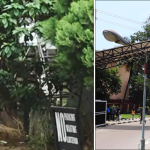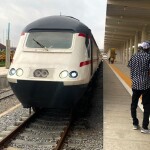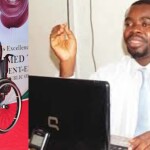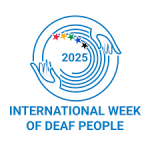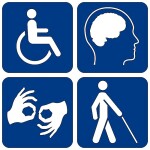UNILAG prefers a decades-long tradition to the Discrimination Act in managing its disability affairs. A defining crisis rocks the school now, but its authorities ignore the golden moment.
Elijah Olusegun
While the Discrimination Act 2018 provides for inclusion of persons with disabilities in matters of accessibility to public buildings and places, the University of Lagos has taken a decision that worries many hoping the law will someday have a bite in academia.
The school management recently shipped out its students with disabilities, including those with visual impairments, triggering an accommodation crisis which has been lingering for weeks since resumption.
Lukman Salami, chairman of the Lagos chapter of the Nigeria Association of the Blind, told ER the school’s decades-long tradition of housing students with disabilities, alongside their helpers, has engendered inclusion over the years.
“It helps their colleagues with no disabilities sharing rooms with them to understand disabilities better,” he told ER Nov 16, after submitting a letter of appeal to the management of the federal university.
But the decision to relocate them threatens the sustenance of the opportunity for further inclusion,; it equally foreshadows a disruption of whatever measure of access the students with disabilities enjoyed so far.
Cramming four blind students without a sighted person into a room, NAB noted, is ‘segregation, with adverse effects on both sides’.
The association said its initial findings revealed the former hostel is under renovation, as the management told the students while moving them to a temporary hostel.
“But if care is not taken, the school may not revert to the former practice which had enabled the students with disabilities make the best of their study years,” the lawyer told ER.
Section 27 of the Discrimination Act states:
If accommodation is being provided by schools for their students, employers for their employees, service providers for their customers, organization for their members, government for the people and in any circumstance whatsoever, persons with disabilities shall be given first consideration.
The circumstance here, according to Dean of Students Affairs (Prof) Musa Obalola, was the school’s system of online balloting for accommodation running into technical glitches late October.
The school authorities said they did their best to make the process open to all students that could afford one. “It depends on the devices the students are using to access the portal,” the DSA said earlier in the crisis
But most of the students in the campus disability community, whom the school exempts from balloting, have not secured bed spaces, three weeks after resumption.
Those who have are yet to get, and may never do, for their helpers.
“We understand the reality that the number of students jostling for the available spaces are high compared to the available spaces,” NAB stated in its letter the school already acknowledged.
From earlier reports, ER learnt no fewer than 35,000 students balloted for hostel accommodation that can only take on 8,000, including students with disabilities, and their helpers who do not ballot.
“But it is our candid and passionate submission that the helpers are University of Lagos students, and, all things being equal, these helpers are eligible for hostel accommodation,” the letter read in part.
ER e-mailed the school’s communication unit a request for clarification on this point of law and its implementation. No response yet.
UNILAG can claim it gives its PWDs the right of first refusal the law demands. But the manner of implementation has always been an afterthought. The school has no documented policy or a body regulating disability affairs, including its time-tested hostel accommodation arrangement.
These put the school’s disability community at the mercy of the management. And the authorities’ hit-or-miss approach has worked only for as long as they have a sympathetic DSA—or a VC whose heart bleeds for students with disabilities.
Yet the Nigerian Discrimination Act, in sections 3 to 8, and 27, provides access, inclusion, and equality for students with disabilities—as rights.
Marere, the hostel under construction till December, has been the traditional resort for students with disabilities, including the blind, the wheelchair users, and their helpers.
Michael Fadeyi, an alumnus of UNILAG and PhD student of feminist disability studies at University of Sussex, UK, told ER he and his helper bunked up at Marere as undergraduates over two decades ago.
In his final year, a similar management’s decision—to crowd the two-man room with two more occupants—came up. He and his colleague resisted, and the school backed down.
He cannot understand while a tradition that fostered inclusion over the years when there was no disability law should be tampered with now.
“It’s a setback for the school to be experiencing this now when it ought to make reasonable adjustment of the practice to the Disability Act,” he said.
He, too, considered it discriminatory for UNILAG to bring up a makeshift arrangement that packed four blind students into a room in Jaja Hostel.
The accommodation crisis has become one of the litany of face-offs that mark the tenure of the new VC Prof. Folashade Ogunsola.
Like NAB, Fadeyi suspected the decision may become the new norm if nobody takes action. Especially now that it concerns minority students.
When it concerned the entire student population months ago, the new management’s earlier aggressive drive, particularly for revenue generation, provoked widespread reactions. Many of the school facilities handed over to concessionaires, and the 400-percent spike in school and other fees sparked a long-drawn-out stand-off between the National Association of Nigerian Students and the UNILAG management. And up till now, the VC, in particular, still strikes many of the students as different.
Ogunsola, however, gave her reason for doing what she did: about N2bn the management spent yearly to keep the school and its programs running outstripped the amount it generated.
And the varsity didn’t just shake the students down for more. During a July virtual press conference, the VC reeled out a chain of initiatives her administration already put in place to ease the pinch: a work-study opportunity, a BRT-UNILAG transport arrangement, scholarship, adoption of indigent but brilliant students, and fee payment by instalment.
How much these benefit those students with disabilities is not clear, especially in an institution where disability management tags along mainstream issues.
The accommodation crisis is not the first to expose the state of accessibility and inclusion at the federal university. Or its compliance with the Discrimination Act.
The covid-19 response during the 2020 academic session brought about virtual learning. Lecturers uploaded all lecture materials on the school e-learning portal, and students with disabilities could access them on their own. No use of human readers and copiers from textbooks—since there are no braille textbooks.
“It was the best time of my study at UNILAG,” a student with disability told ER early in the year.
Just as it is with all things sweet, her new lease on academic life ended suddenly as the institution reverted to its former way of teaching. The blind and the deaf students, for instance, now have to depend on others and lip-read respectively.
All of these are nothing but part of a pattern of back-fitting disability issues in Nigeria.
On the on-going hostel crisis, Fadeyi urged the minority students to resist the management’s decision. “I didn’t cower then. If the students do now, the management will never stop,” he said, calling on NAB, other clusters, and the National Commission for Persons With Disabilities to intervene.
“And if need be, we will take it up with the school.”


